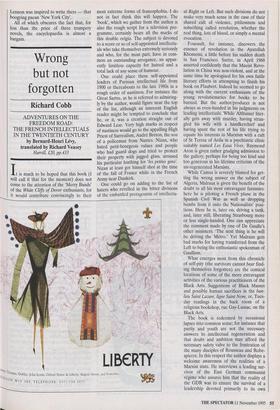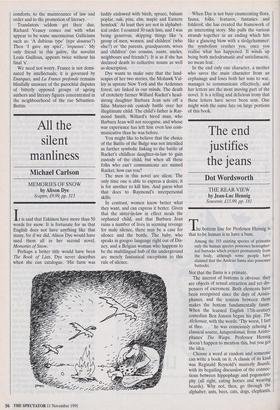Wrong but not forgotten
Richard Cobb
ADVENTURES ON THE FREEDOM ROAD: THE FRENCH INTELLECTUALS IN THE TWENTIETH CENTURY by Bernard-Henri Levy, translated by Richard Veasey Harvill, £20, pp.433 It is much to be hoped that this book (I will call it that for the moment) does not come to the attention of the 'Merry Bands' of the White Cliffs of Dover enthusiasts, for it would contribute convincingly to their most extreme forms of francophobia. I do not in fact think this will happen. The `book', which we gather from the author is also the rough script for a television pro- gramme, certainly bears all the marks of this double origin. The subject is devoted to a score or so of self-appointed intellectu- als who take themselves extremely seriously and who, for the most part, have in com- mon an outstanding arrogance, an appar- ently limitless capacity for hatred and a total lack of any sense of humour. One could place these self-appointed leaders of Parisian intellectual life from 1900 or thereabouts to the late 1980s in a rough order of nastiness. For instance the Great Sartre, as he is referred to admiring- ly by the author, would figure near the top of the list, although an innocent English reader might be tempted to conclude that he, or it, was a creation straight out of Edward Lear. Very high marks in respect of nastiness would go to the appalling High Priest of Surrealism, Andre Breton, the son of a policeman from Nantes. Nizan, who hated petit-bourgeois values and people who had guard dogs and tried to protect their property with jagged glass, aroused his particular loathing for `les petites gens'. Nizan at least got himself shot at the time of the fall of France while in the French Army near Dunkirk. One could go on adding to the list of haters who revelled in the bitter divisions of the embattled protagonists of intellectu- al Right or Left. But such divisions do not make very much sense in the case of their shared cult of violence, pitilessness and something called revolution, whether the real thing, lots of blood, or simply a mental evocation.
Foucault, for instance, discovers the essence of revolution in the Ayatollah Khomeini, a little before his sudden death in San Francisco. Sartre, in April 1968 asserted confidently that the Maoist Revo- lution in China was non-violent, and at the same time he apologised for his own futile literary efforts in attempting to finish his book on Flaubert. Indeed he seemed to go along with the current enthusiasm of the young revolutionaries for books to be burned. But the author/producer is not always as even-handed in his judgments on leading intellectuals. While Althusser liter- ally gets away with murder, having stran- gled his wife with a handkerchief and having spent the rest of his life trying to equate his interests in Marxism with a cult of St Teresa of Avila in a psychiatric clinic suitably named Les Eaux Dives, Raymond Aron is given rather grudging admission to the gallery, perhaps for being too kind and too generous in his lifetime criticism of the un-regenerated Marxists.
While Camus is severely blamed for get- ting the wrong answer on the subject of Algeria, Malraux is given the benefit of the doubt in all his most extravagant fantasies: here he is piloting a French plane in the Spanish Civil War as well as dropping bombs from it onto the Nationalists' posi- tions. Here he is, later on, driving a tank, and, later still, liberating Strasbourg more or less single-handed. One can appreciate the comment made by one of De Gaulle's other ministers: 'The next thing is he will be driving the Metro.' Yet Malraux gets bad marks for having transferred from the Left to being the enthusiastic spokesman of Gaullism.
What emerges most from this chronicle of self-pity (the survivors cannot bear find- ing themselves forgotten) are the comical locations of some of the more extravagant activities of the various practitioners of the Black Arts. Suggestions of Black Masses and possible human sacrifices in the ban- lieu Saint Lazare, ligne Saint Nom, or, Tues- day readings in the back room of a religious bookshop, rue Gay-Lussac, on the Black Arts.
The book is redeemed by occasional lapses into common sense; for instance that purity and youth are not the necessary answers to intellectual regeneration and that doubt and ambition may afford the necessary safety valve to the frustration of the many disciples of Rousseau and Robe- spierre. In this respect the author displays a welcome awareness of the realities of a Marxist state. He interviews a leading sur- vivor of the East German communist regime who assures him that the reality of the GDR was to ensure the survival of a leadership devoted primarily to its own comforts, to the maintenance of law and order and to the promotion of literacy.
Translators seldom get their due. Richard Veasey comes out with what appear to be some unconscious Gallicisms such as: 'A dubious type' (type douteux?) Then ‘I gave my spiel', 'impasses'. My only friend in this galere, the novelist Louis Guilloux, appears twice without his final We need not worry. France is not domi- nated by intellectuals; it is governed by Enarques, and La France profonde remains blissfully unaware of the parochial disputes of bitterly opposed groups of ageing authors and literary figures concentrated in the neighbourhood of the rue Sebastien- Bottin.



















































































 Previous page
Previous page